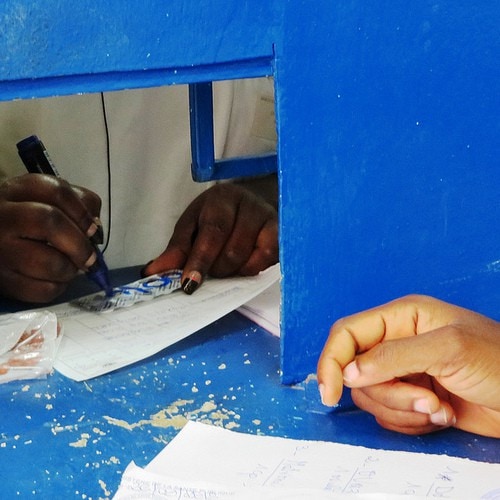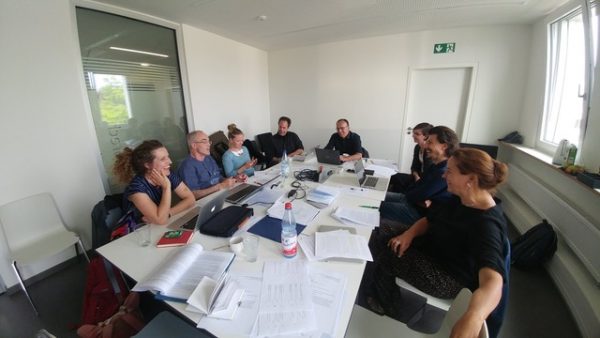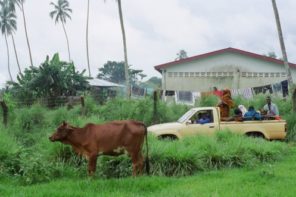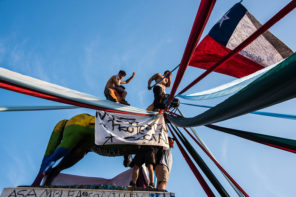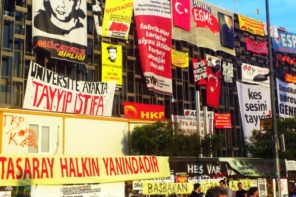With #anthrostate, allegralab seems to suggest that there is a distinct subdiscipline of anthropology that studies the contemporary state. However, following Bourdieu (1994), Navaro-Yashin (2002) or more recently Wacqant (2009), even a particular state and a particular bureaucratic institution may appear as multi-faceted, as possessing a left (caring) and right (violent/ regulating) hand. In January 2018, allegralab proposed a thematic week centered around “the state of the state in Africa” in order to explore the productive tensions in anthropology “between those seeking to grasp the state by examining it ‘at work’(Bierschenk and de Sardan 2014), and those who argue that the state is perhaps better captured in its margins rather than its supposedly transparent and rational bureaucratic forms (Das and Poole 2004)”. On what grounds can we thus compare anthropologies of the state or of stateness? What if anthropologies of the state in part come to differ based on the political, disciplinary or regional background of researchers? In his Allegra blog post revisiting States at Work (16.1.2018), Thomas Bierschenk claimed that one of the book’s objectives was to “develop a more intensive dialogue with the sociology of organization and bureaucracy in the North, while the latter would profit from taking the results of the ethnographies of states in the Global South into account.”
In order to take these ideas seriously and make such exchanges possible, Thomas Bierschenk (Mainz); Heath Cabot (Pittsburgh) and Heike Drotbohm (Mainz) convened the workshop “The State, Anthropology, and the South”, which aimed at bringing different networks and research traditions into dialogue.[1] The objective of the workshop was to explore in detail the different analytical and methodological approaches with which different research groups have respectively approached the study of the state and notions of “the South” by bringing together scholars working in sites of the Global South with those working in the European South.[2] A key goal of this exploratory workshop was to initiate a dialogue across research and linguistic traditions, disciplinary approaches, and areas of expertise, among a small but diverse group of participants: Thomas Bierschenk, Heath Cabot, Heike Drotbohm, Tom de Herdt, Barak Kalir, Timothy Raeymaekers, Eva Riedke, Annalena Kolloch and myself. Apart from bringing researchers together and discussing each other’s work, the workshop meant to encourage a self-reflexive look at one’s own disciplinary, methodological and political-moral presuppositions. How had the researchers’ (and their research networks’) respective regional orientations, analytical terms, theoretical inspirations, thematic choices, methods of research, comparative approaches and political or moral standpoints influenced their experiences with and assumptions about the state and how had these subsequently came to be reflected in their writings? What moral judgments and which political orientations lie behind our studying the state? What is the “South” said to mean in anthropologies of the state and how does it become manifest, and how does the idea of “the South” figure in the reflections of research interlocutors? To what extent is the framing mechanism of the “South” (whether implicit or explicit) a product of researchers’ own assumptions?
In other words, the workshop’s main goal was to sow a seed of wonder about how we actually look at “the state”. Let me turn to my own research in order to explain this.
A few weeks before the workshop, I had accompanied two social welfare officers of the Family Crisis Intervention Team in Bongouanou in Southeastern Côte d’Ivoire. The team is part of the local state structures to promote good childhood and social cohesion. As part of the Social Welfare Centre it is administered by the Ministry of Women, Child Protection and Solidarity. Here is an excerpt of my field notes of that encounter:
Today Monsieur Konan[3] and his two younger colleagues deal with a family dispute of two brothers that had unfolded over the heritage of a piece of land of their deceased father. Attempts to settle the problem within the larger family and with the village chief had failed and eventually the younger brother presented the problem to the Family Crisis Intervention Team. In several meetings they had listened to the younger brother’s version of the problem, his elder brother’s version, before today bringing them together to the social welfare center in Bongouanou. Monsieur Konan patiently allowed both sides to elaborate lengthily about what they felt was right and apt and the complex social entanglements and family relationships of each brother with the deceased father and the extended family. While he listening, he would suggest several solutions which were all for one reason or another dismissed by one or both complainants. In his suggestions, the social welfare officer adopted a moralizing tone and urged the brothers to accept his help in finding a solution that would not “break the family – because after all you are brothers, same blood, this affaire ought not to be taken to court”. As the discussion between the two brothers gets more and more violent, Monsieur Konan and his colleague position themselves as the “advocates” of the disputing parties, translating their respective worries and hopes and propose solutions that seemed to have evolved in dialogue and thus would allow both sides to feel as “winner”. Finally, Monsieur Konan and his colleague suggested that they would have to come and see the disputed field with their own eyes; the clients agreed to stay off the disputed field and work on their other plantations until the date of that field visit. Both brothers seemed to respect the authority of the social welfare officer as neutral intermediary and placed much hope in his capability to settle their dispute, even though the younger one only grudgingly accepted to pay the carburant for Konan’s field trip (as is usual practice).
In this ethnographic vignette the state appears and presents itself as a caring institution, whose aim is to help maintain and create social cohesion among a population, which is not capable of doing this on their own and gratefully and voluntarily uses the state services for their own purposes. The social welfare workers presented themselves as caring agents and juxtaposed their work with that of other state officials, such as police officers and judges, whose intervention, in contrast, would supposedly cause more harm and violate family bonds. In my research on parenting practices and experts in the field of becoming and being a good parent I had stumbled across Monsieur Konan and his colleagues because of the regular parenting skills teachings they offered at their center. To him, he said, people would really come only in case of severe problems. Without hesitation, I had happily agreed to learn more about his work and quickly found myself again – as in earlier research projects – associated with state officials and their point of view. This clearly was due to my socialization into the anthropology of the state from within the research project “States at Work”, which had focused on the day-to-day functioning of the state in West Africa.
As I skim through my field notes preparing the next field trip, the questions discussed at the workshop raise a number of questions. To what degree was the situation described above influenced by the fact that the Family Crisis Intervention Unit in Bongouanou is a particular state agency situated in a particular place at a particular time and looked upon by a particular anthropologist? Would the story I told in my field notes and its interpretation have differed had it been observed in a German or Greek social welfare center? Would it have differed, had I approached the situation from and with the clients instead of the social welfare officers? Would it have been different if had it been told from the perspective of other quasi-state institutions and associated actors such as the village chief or one of the many civil society organizations concerned with reconciliation and social cohesion after war? Would it have differed if the research interests behind the narration had been land rights or state legitimacy instead of family norms? And finally, would it have differed if I had not grown up in a country where “the state” and its agents are usually presented as caring and where children are instructed to trust state institutions (“the police your friend and helper”)? Would it have differed if I had experienced the state first and foremost as violent or repressive, as it might have been the case if I was a black man and not a white woman?
Answers to questions like these, the conveners of the workshop believed, would help to tackle the tacit or explicit notions of studying the state with the aim to make comparison possible and fruitful.
The only way to deal with that epistemological challenge is to bring together works dealing with different facets of the state, governmentality and bureaucracy. All based on ethnographic fieldwork in different regions of the Global South and its fuzzy and shifting frontiers (West and Central Africa, Cape Verde, Brazil, Italy, Spain, Greece, the Netherlands, Israel) the papers and discussions dealt with bureaucrats and their choices and rationalities of practice in a comparative and historically informed perspective – thus avoiding culturalist explanations about e.g. the nature of African (or Southern) states as compared with their Western model (see e.g. Titeca and de Herdt 2011). They traced the “state effects” in encounters between migrants, refugees and humanitarian organizations in borderlands or shifting frontiers between state or state-like actors and institutions which, in the co-delivery of public services, bring about the state as affect through performance and practices (see e.g. Kalir and Wissink 2016; see also Raeymaekers 2018). Another topic that was raised in this context was the distribution and redistribution of scarce resources and ideals and practices of governance in the context of crises (e.g. in refugee camps) and aspirational ideas of a properly functioning state of rights (Cabot 2014). Acknowledging that different actors are involved in the negotiation of stateness between norms and practices, which let bureaucracies appear as multi-normative spaces and sites of contention not only between different actors, but also between competing ideas and norms, papers also discussed the janus-faced character of discretionary power both on the side of state-agents and bureaucrats as well as regarding competing institutions and actors and the clients of state services (see e.g. Drotbohm 2018). Ethnographic research on the police and on the judiciary system have shown that actors also make use of different registers to present themselves as “friendly” and “caring;” as imperturbable and cold; or even as violent enforcers of the law (see Beek 2016; Beek et al 2017; Bierschenk 2008; Göpfert 2016). However, discretionary powers are not only exercised by state officials, but also by the clients, who may choose to use state services or not, and who may choose to approach them in various ways? Bureaucratic practices are in many ways performative – whether employed by state officials, by their clients or by quasi-state agents. In some way or another they perform but also sometimes contest the legitimacy of the state and affirm its overall presence – notably in former colonies where “the state” and its agents have a colonial legacy still inscribed in the “civilizing” and humanitarian mission that characterizes the self-understanding of many bureaucrats.
One of the major aims of the workshop then was to de-essentialize not only “the state” but also “the South”, treating both not as analytic constructs, but as analytic objects of anthropological inquiry.
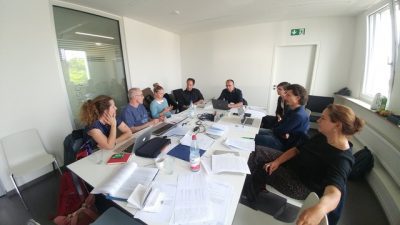
References
Beek, Jan 2016. Producing Stateness: Police Work in Ghana. Leiden: Brill
Beek, Jan, Mirco Göpfert, Olly Owen, and Johnny Steinberg. eds 2017. Police in Africa: The Street Level View. Oxford: Oxford University Press.
Bierschenk, Thomas 2008. “The everyday functioning of an African public service: informalization, privatization and corruption in Benin’s legal system,” Journal of Legal Pluralism 57: 101–139
Bierschenk, T. and J.-P. Olivier de Sardan, eds. 2014. States at Work: Dynamics of African Bureaucracies. Leiden: Brill.
Bourdieu, Pierre 1994. “Rethinking the state: on the genesis and structure of the bureaucratic field”, Sociological Theory 12: 1, 1-19.
Cabot, Heath. 2014. On the Doorstep of Europe: Asylum and Citizenship in Greece. Philadelphia: University of Pennsylvania Press.
Das, Veena, and Deborah Poole. eds. 2004. Anthropology in the Margins of the State. Santa Fe: School of American Research Press.
Drotbohm, Heike. 2018 [forthcoming]. “Care and reunification in a Cape Verdean family: changing articulations of family and legal ties,” Ethnography.
Göpfert, Mirco. 2016. “Repairing the law: the search for justice in the Nigerien gendarmerie,” Theoretical Criminology 20 (4): 446-461.
Göpfert, Mirco. 2017. “Bureaucratic aesthetics: report writing in the Nigérien gendarmerie,” American Ethnologist 40 (2): 324-334.
Kalir Barak, and Lieke Wissink 2016. “The deportation continuum: convergences between state agents and NGO workers in the Dutch deportation field,” Citizenship Studies 20 (1): 34-49.
Navaro-Yashin, Yael. 2002. Faces of the State: Secularism and Public Life in Turkey. Princeton: Princeton University Press.
Raeymaekers, Timothy. 2018 [forthcoming]. “Liquid thresholds: migrant territorializations and the Mediterranean crisis,” Social and Cultural Geography.
Titeca Kristof and Tom De Herdt. 2011. “Real governance beyond the ‘failed state’:n egotiating education in the Democratic Republic of Congo,” African Affairs 110 (439): 214-231.
Trouillot, Michel-Rolph. 1991. “Anthropology and the savage slot: the poetics and politics of Otherness,“ in Richard Fox, ed. Recapturing Anthropology: working in the present. Santa Fe: School of American Research Press: 17-44.
Wacquant, Loïc 2009. Punishing the Poor: The Neoliberal Government of Social Insecurity. Durham and London: Duke University Press
[1] There is, in fact, an allegra-documented genealogy of the workshop in Mainz. Half-a-year ago, Heath Cabot reflected in a conference report about her participation at the biannual meeting of the German Anthropological Association in Berlin. The panel on the “refugee crisis” organized by Olaf Zenker, was critiqued as “as being overly focused on ‘the underdogs’ […] and indulging in ‘moral high ground,’” through its focus on refugee and activist perspectives. In her 2014 book, On the doorstep of Europe, Cabot had analyzed the role of NGOs in the governance of asylum seekers and refugees in Greece and thus non-state-actors engaging in state-like services and governance practices and addressed the ambivalent position these actors had towards “the state”. In the discussion of her presentation in Berlin, it was suggested that it would be useful to “also study bureaucrats or decision-makers in their encounters with migrants”. Most of these comments came from the “angry-seeming folks from the University of Mainz”, where a research project on states at work had studied “the state” in ethnographies of bureaucrats and bureaucratic actors in order to de-essentialize the state. The exchange nonetheless led to a fruitful collaboration.
[2] The workshop was sponsored by several funding bodies at University of Mainz, particularly the Förderlinie 1 and the Zentrum für interkulturelle Studien (ZIS).
[3] All names used are pseudonyms.
Featured image by Anouk Delafortrie (flickr, CC BY-ND 2.0)

